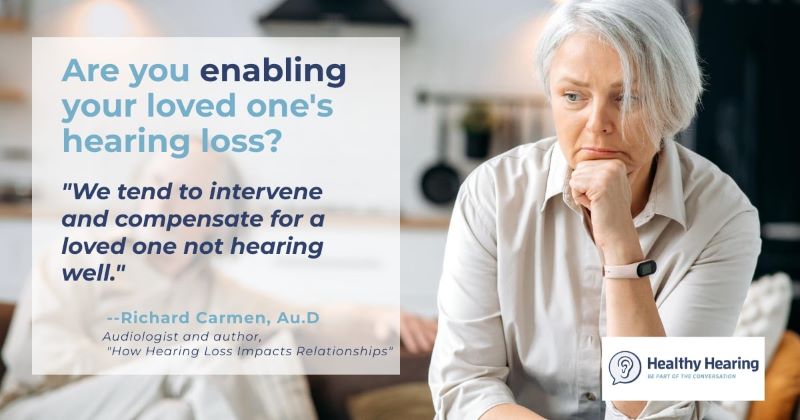|
www.HealthyHearing.com |
Are you unknowingly enabling your loved one’s hearing loss?
Contributed by Joy Victory, managing editor, Healthy Hearing If your loved one has untreated hearing loss and you find yourself constantly having to help them hear, you may be enabling their reluctance to get the help they need. Although you're trying to be helpful, in the long run, this enabling behavior can be harmful to both of you, creating a cycle of codependency and resentment. 
“When it comes to persistent untreated hearing loss, 'help' can turn into habit,” audiologist Richard E. Carmen, Au.D., said. “When a family member [trying to help] too often begins repeating words, sentences, then rephrasing and interpreting thoughts and ideas that were missed, it’s way past time for professional help.” Examples of enabling hearing lossThe desire to assist is a natural inclination born out of love and kindness, said Dr. Carmen, who is a clinical and research audiologist, author and publisher. He has served the Deaf and hard of hearing for more than 50 years. “We don’t want loved ones to appear foolish, disinterested, bored or embarrassed and, for these reasons and more, we tend to intervene and compensate for a loved one not hearing well,” he said. Enabling behaviors include:
Untreated hearing loss and codependencyIn many cases, hearing loss happens gradually with age. Known as age-related hearing loss, symptoms include trouble understanding conversations, especially in noisy environments, and difficulty distinguishing the high-pitched sounds in speech, such as “s” or “th.” And, although keeping a family member engaged in the communication circle by using compensatory behaviors begins innocently, the resulting reactions and sentiments that occur often adversely affect family dynamics in one of two ways:
“It’s important to realize that with many years of untreated hearing loss by one family member and development of compensatory behaviors by everyone, it is the entire family that has the hearing problem,” Dr. Carmen said. For help sorting through these problems, we have tips and advice for easing the relationship strain caused by hearing loss. 
a loved one's untreated hearing loss affects you. What’s the solution?Because age-related hearing loss happens gradually, family members should be observant. Persistent requests to have others repeat what they’ve said or the inability to hear common sounds, such as a telephone or doorbell ring, are all indicators a loved one may have hearing loss. Brush up on communication tips for hearing loss, but also don't slip into compensation and risk caregiver burnout. Your loved one will be better off if they don't spend years relying on you to compensate for their hearing loss, especially when treatment is available and effective. The first step? A hearing test. “The best way to catch hearing loss at its onset is to receive an annual hearing assessment by an audiologist,” Dr. Carmen said. “Insurances often cover these costs and some carriers will even cover hearing aids.” Medicare typically pays for hearing tests for older adults, for example, and the VA helps veterans with hearing loss or tinnitus. Hearing aids are 'brain' aidsIn many cases, hearing aids will be the recommended treatment. Of course, getting to this point may be the hardest part of the journey: If your loved one has been in denial about their hearing loss, this is normal and quite common. It may be useful to point out to your loved one that hearing aids are good for their health. They may not be aware that hearing loss is linked to cognitive decline and causes listening fatigue and overall exhaustion, for example. It also may help to share transformative stories of how hearing aids helped people regain the sounds—and quality of life—they were missing. Joy Victory, managing editor, Healthy Hearing
|
Featured clinics near me
Earzlink Hearing Care - Reynoldsburg
7668 Slate Ridge Blvd
Reynoldsburg, OH 43068

Find a clinic
We have more hearing clinic reviews than any other site!


 Joy Victory has extensive experience editing consumer health information. Her training in particular has focused on how to best communicate evidence-based medical guidelines and clinical trial results to the public. She strives to make health content accurate, accessible and engaging to the public.
Joy Victory has extensive experience editing consumer health information. Her training in particular has focused on how to best communicate evidence-based medical guidelines and clinical trial results to the public. She strives to make health content accurate, accessible and engaging to the public.